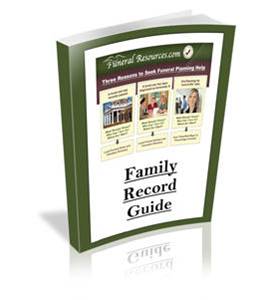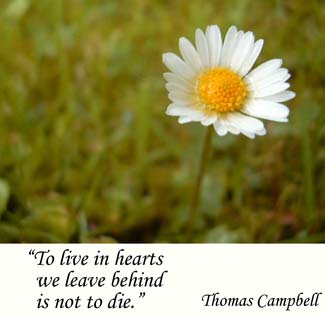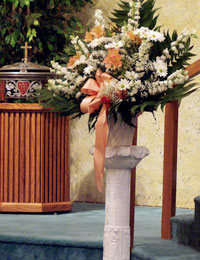How To Give a Eulogy
Giving a Eulogy is Hard To Do…
But Good Things Don’t Come Easy
Most people will probably say they dread giving a funeral eulogy. This is partly because one of the biggest fears most people have is public speaking, and partly because it is so difficult and emotional to summarize a person’s life story in a series of moments.
I had to give a funeral eulogy at a loved ones memorial service, and I will not hesitate to tell you that it was extremely difficult. Afterward I felt like I had experienced just about every emotion possible. Some of the toughest parts were being nervous, having to reflect on my grief and loss, worrying about getting through it without breaking into tears, and trying not to forget anyone. Some of the best parts about this was reflecting back on all of the great memories, the special people in her life, the amazing things she did for me and others, the funny stories, and being able to heal by sharing and expressing my thoughts and feelings.
I worked so hard, for what felt like countless hours, to try to find all the right words, recall all the most important memories and stories, and mention all the key people in her life. And to be very honest, I wish I could go back and do it again. To this day, I still look back with regret, wishing I could go back and say some things I neglected to mention.
Tips To Giving a Good Eulogy
In the event that you, or anyone you know, needs to give a eulogy, I have put together some tips that I learned that I hope can help you:
Giving a eulogy is a good thing for you
It may hurt to write a eulogy, and it also might be hard to read it. For some, that is the worst part. The world might spin a little, and everything familiar to you might fade for a few minutes. But remember, remind yourself as you stand there that you are the lucky one who gets to tell everyone about this special person.
You were selected to face the group, the family, the world, and summarize the story of this loved ones life. You are the one being asked to do something at the very moment when nothing can be done. You are the one who gets the last word in the attempt to define the outlines of a life. You are the one who gets to tell everyone who this person was, the differences they made in so many lives, and the reason their life should be celebrated. You are the one who gets to heal through this grief and loss process.
So it really doesn’t matter what you say, or how you say it. The reality is this opportunity is both a privilege and a gift.
Don’t feel like you have to accept this offer
If on any level you are not interested in taking on this task, for whatever reason, that is perfectly OK. Some people may choose to decline this gift for a variety of reasons. They might feel putting together the story of someone’s life is too difficult, or too emotional. Some people are simply too overcome with bereavement and grief. Some people may feel like they are not the most appropriate person. Others may feel as if they are not great expressing feelings or emotions publicly.
So know that whether you choose to accept this gift and give a eulogy, or not, there are no wrong decisions. It is totally a matter of preference and comfort.
Creating a funeral eulogy will be difficult
Be prepared for the harsh reality that this will be a difficult thing to do, from beginning to end. Writing and reading of a funeral eulogy is, above all, the simple and elegant search for small truths. They don’t have to be truths that everyone agrees on, or even that everyone knows about. The should just be the ones most people will wither recognize or appreciate. This can be surprisingly hard to make note and mention of some of the smallest of details of a life. But some of these details can define a person, and even serve as a form of recognition.
What I am referring to is small examples like:
- She cared more about her family and her friends than she did herself.
- He loved to talk about his football team, his military background, his career.
- She never wanted to talk about herself, but rather listen and learn about you.
- He had a loud voice that could be heard across a crowded room.
- She always said and did the right things.
- He was never found anywhere without a cigar in his hand or mouth.
- She lived for gardening, and I will always think of her with every beautiful flower.
Don’t worry about time
They may tell you have have a specific period of time, and that there is a set schedule. They may tell you that you have three minutes, or five minutes. They may tell you to take all the time you want. Don’t listen or follow any limitations, as I firmly believe that time constraints are always an insult at funeral or memorial services.
Of course you want to be respectful and work within the finite space you’ve been given, and remember that the funeral eulogy is just one part of the memorial service. However, tell your story, express your feelings, and it this ends up being shorter or longer than others may wish, it does not matter at all.
Remember who to speak to
As you stand there, think about the room as being filled with rings of loyalty. The people in the nearest ring, or those closest to you, likely in the front row, are owed the most. You should speak first to them. And then, in the next measure, consider speaking to room itself, which is the next ring, which is usually filled with the closest family, friends, and loved ones. Then consider speaking to the last right, which is the physical world outside, the neighborhood, the town, the place, the groups, the clubs, the associations, the companies, etc.
So try to remember your rings of loyalty, and also try to speak to them in the order they deserve.
Be sure to put your thoughts in writing
You must be sure to write down all of your thoughts. In grief, people can have a tendency to wander through memories that may not be acute, relevant, well-framed, or purposeful. Sometimes people can move off track into a personal feelings, stories or conversations that are not necessarily appropriate. Therefore, make sure to have you thoughts documented, or at the very least a general outline.
You might be struck with emotion or cry
To give a funeral eulogy is one of the most emotional experiences you can go through in life. With that in mind, you must accept that fact that you might get extremely emotional, cry, or even reach a point where you cannot continue. But if possible, try not to give up. Just remember that everyone who is in attendance and listening can fully understand and relate to the fact that giving a funeral eulogy is an extremely difficult and emotional thing to do. And also remember that everyone admires and respects you for having your courage and contribution to express these special words with them.
Since you may become overwhelmed with emotion or cry, this is another reason why you should have everything in writing. This can help you stay on track, not lose your focus, and pick up where you left off should you need to stop for emotional reasons.
One final suggestion is to have a backup plan. Sometimes close loved ones can break into an emotional state where they simply cannot recover or continue. If you feel like this might happen to you, make sure you ask someone to be there for you, and be ready to come up and help you finishing giving your funeral eulogy. Again, everyone understands and appreciates you for sharing, whether you finish or not.
Practice, practice, practice
As with any public presentation, the best thing you can do is practice this speech. Read it aloud until you feel comfortable with the content and how it flows. Practice and rehearse to the point where you might even be able to give this eulogy without reading if you had to.
Another major advantage to practicing is it will help you evoke the emotions you have inside, and determine which parts are the most difficult to deliver. This can help you prepare more intensely in certain areas, or even redesign how to give a eulogy, if you feel like you need to minimize some of your emotions to get through this.
Prepare yourself for in case something goes wrong
Often times during public speeches, especially during such sensitive gatherings such as funeral home services, events can occur that will throw you off course. There might be a noise, an unexpected emotional outburst, a child crying, or the microphone failing to work properly. Again, this is where practice helps by allowing you to stay on track and keep your composure. If it helps, make up something you say to yourself to help you through those moments and allow you to regain your refocus.
Also, one other note is that many people choose not give a eulogy by reading everything word for word. The use bullet points and the expand on their thoughts from each bullet point, topic, or subject. Keep in mind this during such an emotional and sensitive speech, you may say something that feels “out of line” or inappropriate. But like I mentioned above, that is perfectly normal, to be expected, and something to prepare for and be ready to work through.
Finally, practice speaking slowly, and during times of great importance or intense emotion, learn to pause. A pause is good for you because it allows you to collect your thoughts and gather you composure should you need to. A pause is also good for those in attendance because the silence helps to create a stronger and more powerful message.
Consider using humor
For many people humor and laughs can be a pivot point in a funeral. Especially when the deceased is someone who was known to have a good sense of humor. Eulogies don’t have to always be about the sadness or the loss. They can be about the funny memories, person, or stories.
In fact, some of the best laughs come by forcing people to remember who this person really was, versus strictly “glorifying” them. For example, one of the best ways to use humor is through telling a story about something everyone can relate to about this loved one. This can even be about something that was not among their best qualities. At the closing of your story, the element of surprise always brings a good laugh when you can summarize with a conclusion that no one expects.
In summary
During any good eulogy, you can expect that there will be moments of panic, silence, laughter, sadness, or moments when the speaker gets choked up. Giving a eulogy is almost always accompanied by challenges and surprises. This is one of those things you can fully prepare for, but have no idea what to expect.
However, if you can find the strength to take advantage of this great opportunity, I am fully confident you will be glad you were able to tell your story and express yourself with so many other who share in your thoughts, feelings, and loss. And no matter what happens, no matter what you say, no matter how you feel before or afterward, you will be loved and appreciated by those in attendance, as well as those listening above.
See Our Additional Funeral Eulogy Guides Here
Christopher P. Hill, Founder
FuneralResources.com













